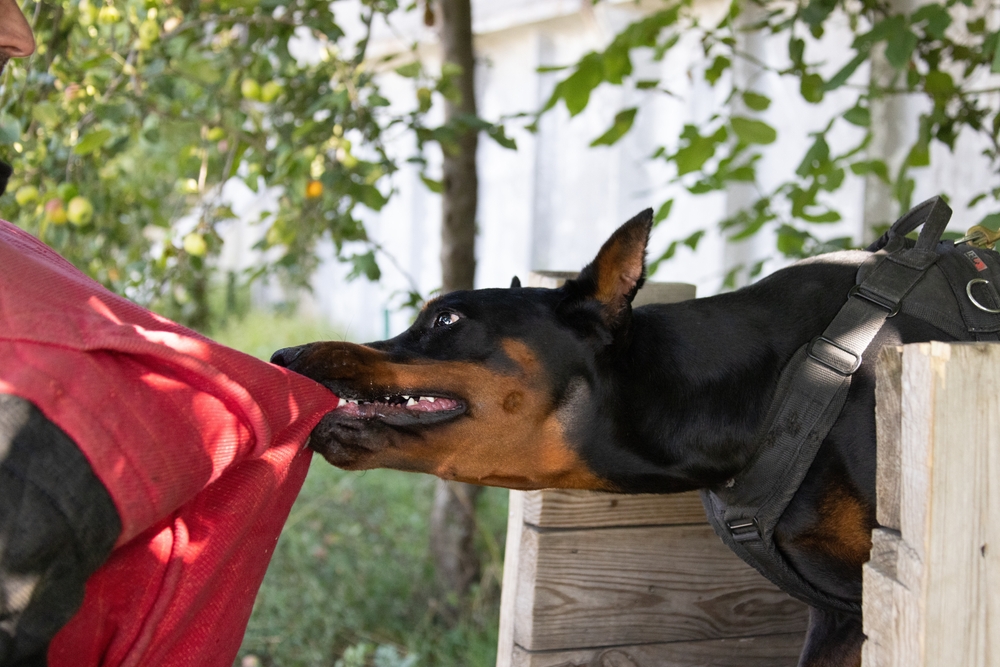Being bitten by a dog is a frightening experience that can happen when you least expect it. One moment, you or your child might be walking in a Milwaukee neighborhood park, and the next, you’re dealing with pain, fear, and confusion after an unexpected dog attack. It’s a situation no one plans for, often leaving victims overwhelmed and unsure of what to do. You might be reading this because a dog bite injured you or a loved one, and you’re seeking information on legal rights and remedies – and you’re not alone. Many Milwaukee families face this trauma every year, and help is available.
If a dog has injured you or your child, knowing what steps to take and how Wisconsin law protects you is essential. This article will walk you through Wisconsin dog bite statistics, the rules on liability, and the legal remedies available to victims. We’ll also discuss practical considerations – from the emotional toll of a dog attack to the following financial challenges. Most importantly, we’ll explain how a dog bite lawyer in Milwaukee can guide you through the recovery process with compassion and experience. Let’s start by understanding the law and your rights.
At Nicolet Law Accident & Injury Lawyers, we provide honest guidance and unwavering support—not pressure. Our priority is helping you understand your rights and confidently make informed decisions. If you have questions, contact us for a free, no-obligation consultation. Call us today at 1-855-NICOLET.
Wisconsin Dog Bite Laws: Understanding Liability and Your Rights
Regarding dog bites, Wisconsin has specific laws to protect victims. Wisconsin is a “strict liability” state for dog bites, meaning that a dog’s owner can be held responsible for injuries regardless of whether the dog has ever shown aggression. Under Wis. Stat. § 174.02, “the owner of a dog is liable for the full amount of damages caused by the dog injuring or causing injury to a person, domestic animal or property.” In plain language, you generally don’t have to prove the owner was negligent – if their dog bit you and caused harm, the owner is on the hook for your losses. Wisconsin law defines “owner” as anyone who **owns, harbors, or keeps a dog. This could even include a person caring for someone else’s dog or, in some cases, an active and present landlord who permitted a dangerous dog on the property.

Strict liability makes it easier for victims to recover damages, but there are some nuances to be aware of. For example, if the dog had previously bitten someone and the owner was aware of it, Wisconsin law allows for double damages in some instances. In other words, if a dog owner knew their dog had caused serious injury once before, they may have to pay twice the amount of damages for a subsequent bite injury. This rule strongly encourages owners to take extra precautions if their dog has a history of aggression. On the other hand, if the bite victim provoked the dog or was unlawfully on the owner’s property, those factors might affect a claim. Wisconsin’s comparative negligence rules could reduce a victim’s compensation if the victim’s actions (for instance, teasing or provoking the animal) contributed to the incident. However, young children, especially those under seven and others who innocently interact with a dog, are generally fully protected under the law.
It’s also important to note that Wisconsin’s laws cover more than just stings. Injuries caused by a dog – such as being knocked over by a large dog – can also make the owner liable under Wis. Stat. § 174.02. In all these scenarios, the Milwaukee dog attack attorney and legal community know that the law intends to protect the public from harm. As a victim, you can seek compensation for your injuries. The law is on your side.
What to Do After a Dog Bite: Timeline and Steps
Experiencing a dog bite is stressful, but taking the right steps afterward can protect your health and your legal rights. Here’s a timeline of what to do after a dog bite in Wisconsin:
- Immediately (Within Minutes): Ensure safety and get medical help. Move to a safe area away from the dog to prevent further injury. If the wound is bleeding heavily or the injuries are severe, call 911 for emergency medical assistance. Wash the wound thoroughly with soap and water as soon as possible to reduce infection risk. Apply first aid (pressure to stop bleeding, bandage the wound) while waiting for medical professionals.
- Identify the Dog and Owner: If you can do so safely, get the name and contact information of the dog’s owner. Also note the dog’s description (breed, color) and whether it wore tags. This information can be crucial for verifying rabies vaccination and filing any reports. If the owner is present, politely ask about the dog’s vaccination status. If the dog is stray or the owner flees, try to remember its appearance and where it went and notify animal control or the police immediately so they can attempt to capture the dog for rabies observation.
- Within 24 Hours: Seek professional medical care even for what may seem like a minor bite. Dog bites can cause deep puncture wounds, and tearing, and carry bacteria that lead to infection. A doctor can clean the wound more thoroughly, prescribe antibiotics if needed, and update your tetanus shot if it’s outdated. Explain how the bite happened; your healthcare provider might also report the incident to local health authorities, which is standard for preventing rabies and tracking dangerous animals (this is not a breach of privacy or HIPAA – it’s allowed for public health reasons). Report the bite to your local Milwaukee County or City Health Department or police. Reporting is important for public safety and can create an official incident report.
- Document the Incident: Write down everything you remember about the attack as soon as you can. Include the date, time, location (Milwaukee residents should note the neighborhood or park, etc.), how the bite occurred, and any conversations with the dog owner or witnesses. Take photographs of your injuries (initially and as they heal) and of the area where they happened. Also, keep bloody or torn clothing as potential evidence (store them in a clean plastic bag). If there were witnesses, get their names and contact information – their statements could be very valuable later.
- Notify Your Insurance (If Applicable): If you have significant medical bills or can be making a claim, you can inform your health insurance and, if a homeowner or renter, possibly your insurance about the incident. However, do not give a recorded statement or sign any settlement offered by the dog owner’s insurance before seeking legal advice. Dog bite cases can become complicated, and insurance companies might try to minimize your claim.
- Within Days to Weeks: Consult a dog bite lawyer in Milwaukee for legal advice. An experienced attorney can help by dealing with the dog owner’s insurance company, preserving evidence, and advising you on the next steps. Early consultation is wise to ensure your rights are protected because Wisconsin law imposes deadlines for taking legal action. Wisconsin's general statute of limitations for a personal injury claim (including dog bites) is three years from the bite date (see Wis. Stat. § 893.54). You typically have up to three years to file a lawsuit if needed. If the victim is a minor, the law gives them extra time – usually until their 20th birthday – to bring a claim. While three years may sound like plenty of time, evidence can disappear, and memories can fade, so it’s best not to delay in pursuing your claim.
- Moving Forward: Focus on your recovery. Follow through with all medical treatments, such as wound care, stitches removal, rabies post-exposure shots (if ordered), or reconstructive surgeries. Keep a journal of your symptoms, pain levels, and any psychological effects (like nightmares or anxiety around dogs). These records can help document the physical and emotional toll the dog attack has taken on you. Your attorney can use this information when seeking appropriate compensation on your behalf.
By following these steps and understanding the timeline, you significantly improve your chances of a smooth recovery and a successful legal outcome. Next, this blog will look at what kinds of legal remedies and compensation you may be entitled to as a dog bite victim in Wisconsin.
The Emotional and Physical Toll of Dog Attacks
A dog attack doesn’t just cause physical wounds; it can also leave deep emotional scars. Understanding the full impact of a dog bite is vital for healing and seeking proper compensation.
Physical Injuries: Dog bites can range from minor puncture wounds to severe, life-threatening injuries. Common injuries include lacerations, punctures, torn flesh, crushed tissue, and even fractures if the dog was large or the attack was violent. Many victims – especially children – suffer bites to the face and head, which can require emergency surgery and lead to permanent disfigurement. These types of injuries often need specialized care from plastic surgeons and can cause noticeable scars. Additionally, infections are a big concern; bacteria in a dog’s mouth can cause serious infections like Pasteurella, staph, or strep, and in rare cases, bites can transmit rabies if the dog isn’t vaccinated. The healing process might involve stitches, antibiotics, rabies prevention shots, and even physical therapy if mobility (like using a hand) is affected.

Emotional Trauma: The psychological effect of a dog attack can be profound. It’s not uncommon for victims to develop a fear of dogs (cynophobia) after an attack. Young children might have nightmares and become anxious or clingy around animals. Even adults can experience post-traumatic stress symptoms – for example, you might replay the attack in your mind, startle easily at the sound of a barking dog, or avoid places (like a particular street or park) where the incident happened. We often see clients surprised by how long these emotional effects last. Something as simple as walking through the neighborhood can become stressful after you’ve been bitten once. Dog bites often catch people off guard – one minute, it’s a typical day, and the next, you’re dealing with a trauma that lingers well beyond the physical wound. Mental health counseling or therapy is sometimes needed to work through these feelings, especially for severe attacks. If you find yourself or your child struggling emotionally after a dog bite, know that this is a normal response, and help (such as therapy or support groups) is available and can be included as part of your claim.
Impact on Relationships: An often overlooked aspect of dog attacks is their strain on personal relationships. Many times, the dog that bit you belonged to a friend, a neighbor, or even a family member. Studies have noted that in roughly half of cases, the victim knew the dog’s owner (it was a family or neighbor’s dog). This can create an emotional dilemma – you might feel angry or betrayed that someone’s beloved pet harmed you, and at the same time you might worry about causing a rift if you pursue a claim. It’s important to remember that you have the right to be safe and to be compensated for your injuries. A good lawyer can often professionally handle the legal process and focused on insurance, which can help reduce personal friction. And if you were the owner’s friend, they should understand that your well-being comes first (and that’s what insurance is for).
Overall, the toll of a dog attack goes beyond the immediate pain of the bite. It can affect your body, mind, and sense of security. Acknowledging these impacts is the first step toward addressing them. Seek whatever help you need – be it medical care, therapy, or legal counsel – to recover fully. Healing from a dog bite isn’t just about closing a wound; it’s about regaining your peace of mind and confidence.
Frequently Asked Questions
What should I do immediately after a dog bite in Milwaukee?
Focus on your safety and health. Get away from the dog to prevent further injury and seek medical attention immediately. Wash the wound thoroughly with soap and water. If the injury is severe (deep wounds, heavy bleeding, or any doubt), call 911 or go to an emergency room. Also, try to identify the dog and owner – get contact information if possible. It’s essential to report the bite to Milwaukee authorities (such as the health department or police) as soon as possible. Prompt reporting helps with rabies control and documents the incident. Finally, consider contacting a dog bite lawyer Milwaukee residents trust to understand what next steps you should take once your immediate medical needs are addressed.
Who is liable for a dog bite in Wisconsin?
In Wisconsin, the law shows that the dog’s owner is liable for injuries the dog causes, regardless of prior behavior. Wisconsin’s dog bite statute (Wis. Stat. § 174.02) imposes strict liability on owners – meaning you typically don’t have to prove the owner was negligent. The owner is responsible for the full amount of the damages. Wisconsin law defines “owner” as anyone who harbors or keeps the dog, not just the legal owner. Sometimes, a person caring for the dog or even a landlord could be considered an “owner” for liability purposes. There are a few exceptions: if you were provoking the dog or trespassing when bitten, it could affect your case. But generally, if you were lawfully present and not antagonizing the dog, the owner (or responsible party) could be liable for your bite injuries.
How long must I file a dog bite injury lawsuit in Wisconsin?
In most cases, you have three years from the date of the dog bite to file a personal injury lawsuit in Wisconsin. This deadline is set by the statute of limitations for personal injury cases (Wis. Stat. § 893.54). You’ll likely lose your right to sue for compensation if you miss this three-year window. There is an important exception for minors. If a person bitten was under 18, they generally have until two years after their 18th birthday to file a claim. Even though three years (or longer for a child) seems like a lot of time, it’s wise to start the process much sooner. Evidence like witness recollections or video footage can become harder to obtain with time. Also, you want to give your attorney ample time to build a solid case before the deadline. To be safe, consult a lawyer before the statute of limitations expires.
Why should I hire a dog bite lawyer in Milwaukee? Can’t I handle the claim myself?
While you’re not required to have a lawyer, hiring an experienced Milwaukee dog attack attorney can significantly benefit your case. A lawyer who knows Wisconsin’s dog bite laws can ensure all aspects of your claim are covered – from proving the owner’s liability under the strict liability statute to calculating all your damages (medical bills, lost wages, pain and suffering, etc.), including future costs. Attorneys are also skilled negotiators who deal with insurance companies regularly. If you have legal representation, insurance adjusters might take a claim more seriously, and your lawyer can push back against low settlement offers. They can handle the legal paperwork, deadlines, and communication, reducing stress. Perhaps most importantly, a lawyer can advocate for your best interests while you focus on healing. Many people who try to handle claims on their own underestimate the value of their case or get tripped up by insurance tactics. Having a dedicated dog bite lawyer in Milwaukee means you have someone who understands the Learn your rights after a dog bite in Wisconsin. Explore liability laws, available legal remedies, and how a local dog bite lawyer can support your recovery.
legal landscape and has a track record of dealing with similar cases. In short, a good lawyer can improve your chances of getting the full and fair compensation you deserve.
How much does it cost to hire a dog-bite lawyer in Milwaukee?
Virtually all personal injury lawyers, including dog bite attorneys, work on a contingency fee basis. This means you pay nothing upfront. The attorney only gets paid if they recover money for you, typically taking an agreed-upon percentage of the settlement or judgment. If the lawyer doesn’t win your case, you owe them no attorney’s fees. At Nicolet Law, for example, we offer free initial consultations and work on contingency, so you have no financial risk in getting legal help. This fee arrangement makes it easier for victims to obtain quality legal representation regardless of their financial situation. Always feel free to ask any attorney you consult to explain their fee structure – reputable firms can be transparent about how contingency fees work and what percentage they charge (usually around one-third of the recovery, but it can vary). In the end, the question to ask yourself is not “Can I afford a lawyer?” but rather “Can I afford not to have one?” – given that having a lawyer often results in a higher net recovery even after the fee, it’s an investment that usually pays off for injury victims.
Work with a Wiscon sin Dog Bite Lawyer

You don’t have to navigate the aftermath of a dog attack alone. By educating yourself (as you’re doing now) and getting the right help, you can hold the responsible parties accountable and secure the resources you need to recover. You should focus on physical and emotional healing while trusting that the legal aspects are in good hands. Every step you take to understand the process is a step toward regaining control of your life after a traumatic event. Stay safe, take care, and know Wisconsin’s laws support you as you progress.At Nicolet Law Accident & Injury Lawyers, we provide honest guidance and unwavering support—not pressure. Our priority is helping you understand your rights and confidently make informed decisions. If you have questions, contact us for a free, no-obligation consultation. Call us today at 1-855-NICOLET.
